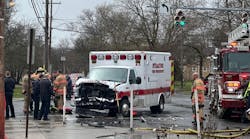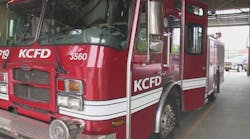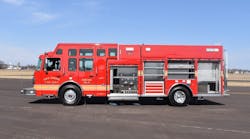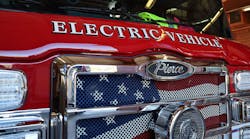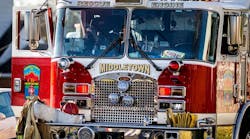As reported in this column, one of the year's first line-of-duty deaths occurred in San Francisco in January, when 46-year-old Firefighter Melinda Ohler, a 13-year veteran of the San Francisco Fire Department, fell out of the jump seat area of a spare San Francisco pumper responding to a false alarm. It was recently reported in the San Francisco Chronicle that the state levied an $18,000 penalty against the San Francisco Fire Department for failing to have rails on certain fire trucks, including the one from which Ohler fell to her death. Cal-OSHA found that the engine was one of eight used by the fire department that have open-air exterior canopy seats (jump seats), but lacked a 46-inch high rail or an enclosure on the sides and back of the vehicle to prevent falls. The department's 42 other engines and 18 trucks have fully enclosed cabs. Officials said that not providing a rail violated the state's workplace safety laws.
Evidence suggests that the firefighter had taken off her seat belt to reach for a headset to protect her ears from noise, authorities said. "An information memorandum was also issued to the city to enforce wearing of seat belts when the vehicle is in motion," the report said. The San Francisco fire chief has ordered that the engine from which Ohler fell and seven others like it be retrofitted with safety bars, a fire department spokesman said.
In an update published in the Richmond Times Dispatch, it was reported that the family of Volunteer Firefighter Bradley McNeer, who died in an apparatus accident in 1999, has reached a confidential settlement, ending an emotional out-of-court battle over his death. The settlement was reached between the family and the driver of the fire truck in which McNeer was riding when it overturned in Chesterfield County, VA. The McNeer family had filed a $5 million wrongful death lawsuit against Chesterfield County, the county fire department and the fire apparatus operator, but the county was dismissed from the suit before the settlement. A county attorney said the doctrine of sovereign immunity barred any recovery from the county through a lawsuit.
As you may recall, McNeer was riding in the front passenger seat of a rescue pumper, one of seven apparatus responding to a gas leak. While responding, the crew realized that they were lost, turned off the siren and began turning off the emergency flashing lights when the driver lost control of the fire truck. He drove into a ditch, hitting a culvert. He overcorrected, and the truck became airborne. The truck struck an approaching vehicle before slamming head-on into a tree.
It was recently reported in the Los Angeles Times that a string of accidents involving motorists who failed to yield to sirens and flashing lights has prompted the Los Angeles Fire Department to propose new guidelines for fire apparatus drivers that officials said could slow emergency response times. For the first time, there would be speed limits for fire trucks, and apparatus drivers stuck in traffic would be required to turn off their sirens and wait until the gridlock clears rather than try to maneuver around vehicles.
Fire officials drafted the rules after an internal review showed that fire vehicles had been involved in 824 accidents from 1999 through 2001. The review did not determine the cause of the accidents, but officials believe most occurred because motorists failed to yield to fire trucks. Better soundproofing and stereo systems in cars, along with cell phones and other distractions, contribute to the problem, officials said.
Many drivers seem either unwilling to yield or are not sure what to do when they hear a siren. Instead of pulling to the right and stopping, some pull to the left, some stop where they are and others just keep going. Firefighters are then forced to second-guess the drivers and weave their way around cars blocking their path, sometimes driving into oncoming traffic, said Captain Craig Nielsen, a driving coordinator for the Los Angeles Fire Department. A battalion chief was blunter: "They think where they are going is more important than where we are going."
Traffic laws require emergency vehicles to operate with "due regard to safety," and the fire department's driving policy lets firefighters to use their discretion when responding to emergencies. Firefighters can travel at any speed they deem safe, based on the time of day, traffic and road conditions. Although there are no speed limits, firefighters are required to stop at all red lights and stop signs, and wait for traffic to clear before proceeding with caution.
The changes, expected to be implemented this year, would impose a variety of speed limits on drivers. Fire trucks would be prohibited from going more than 10 mph above the posted speed limit. Fire trucks driving into opposing traffic lanes and through intersections could travel no faster than 20 mph. Under the rules, fire trucks trapped in traffic must shut down their sirens and wait with other motorists for the congestion to clear instead of pushing their way through. Fire officials said they don't want to force apparatus operators into potentially dangerous situations, such as driving into intersections or into oncoming traffic.
The article noted that fire departments across the nation have been grappling with how to reduce accidents. According to federal statistics, motor vehicle collisions are the second-leading cause of death for firefighters. Some fire departments are experimenting with "on the quiet" response policies that largely eliminate the use of red lights and sirens when responding to emergencies. Proponents said it makes more sense to use the siren only in the most serious cases. Other departments have installed strobe lights on apparatus that automatically turn traffic lights to green so that firefighters have the right of way. Los Angeles police and fire officials plan to team up to crack down on motorists who fail to yield. Beginning this fall, motorcycle officers are riding next to fire apparatus enroute to emergency calls, pulling over drivers who don't obey the sirens.
The following are excerpts from an article written by Matthew Mosk of the Washington Post, headlined "Montgomery Fire, Rescue Crashes Rise": "Drivers of Montgomery County fire trucks and ambulances have had more than 1,100 accidents in the last five years, doing so much damage to the fleet that the Fire and Rescue Service is at risk of losing its insurance coverage, according to county records. Montgomery has received warnings from its insurance underwriter that the mounting losses, totaling nearly $2 million since 1997, "exceed trends from comparably sized fire service clients on both the east coast and the west coast," according to a memo written by the county's fire administrator. Departmental reviews of the most serious accidents, including crashes that left one motorist dead and more than a dozen injured, have found that many could have been avoided had drivers slowed before entering intersections or followed proper procedures as they responded to emergency calls. There is no national benchmark for driving safety in fire departments. Locally, Prince George's County logged 607 crashes during the three years ending Dec. 31, and Fairfax County had 414 crashes, compared with 704 for Montgomery County."
Vincent Brannigan, a professor in the University of Maryland's Fire Protection Engineering Department, was quoted as saying, "It's really a national problem. The people driving these trucks are good people, but their perception of risk is off. It needs to be hammered into their heads: You have no right to risk people's lives on the highway to save people trapped in a fire."
The article continued: "Montgomery officials have known for at least three years that the department's driving record was deficient and that the numbers have been getting worse-up from 154 crashes in 1997-98 to 217 in 2001-02. The county's underwriter, Volunteer Firemen's Insurance Services Inc., has charged progressively higher premiums each year since 2000. In 2002, premiums rose 18% to $1.2 million. With accident costs still rising in December, the fire chief sent a bulletin to firefighters warning that the county Fire and Rescue Service 'is in danger of losing its insurance coverage due to the high number of claims.' 'A major component of this problem is the number of preventable collisions we are currently experiencing,' the chief wrote."
In a recent news release, the International Association of Fire Chiefs (IAFC) said it is "Calling for Members to Adopt New Alcohol Policy." The release continued, "The International Association of Fire Chiefs (IAFC) is calling for its 12,039 fire chief and emergency service members to adopt a zero-tolerance alcohol policy. The statement calls for firefighters to remove themselves from service if they have consumed alcohol within eight hours prior to the beginning of their shift, or if they are still noticeably impaired by alcohol consumed prior to that eight-hour period.
"Many fire and emergency service agencies and organizations raise funds by operating and/or renting their social halls. The IAFC is asking those groups to provide a distinct separation of facilities to help insure the zero-tolerance standard of alcohol consumption by their members who may be called upon to perform official duties.
" 'Many departments already have a policy in place that they are enforcing and the IAFC applauds their efforts. We believe that for the health and safety of our firefighters, emergency service leaders and the citizens we serve that this policy should be adopted everywhere,' said Chief Ernie Mitchell, president of the IAFC. The policy statement was adopted by the IAFC Board of Directors on Aug. 14, just prior to Fire-Rescue International, the organization's annual meeting where 16,700 fire and rescue leader were in attendance. The full policy is below and available on the IAFC website, www.iafc.org/downloads/index.shtml:
"Zero-Tolerance for Alcohol and Drinking in the Fire and Emergency Service"
"This policy statement is most easily described as a 'zero-tolerance' standard about the use of alcohol by members of any fire or emergency service agency/organization at any time when they may be called upon to act or respond as a member of those departments.
"Basically, if someone has consumed alcohol within the previous eight hours, or is still noticeably impaired by alcohol consumed prior to the eight hours, he/she must voluntarily remove himself/herself from the activities and functions of the fire or emergency service agency/organization, including all emergency operations and training.
"No member of a fire and emergency service agency/organization shall participate in any aspect of the organization and operation of the fire or emergency agency/organization under the influence of alcohol, including but not limited to any fire and emergency operations, fire-police, training, etc.
"No alcohol shall be on the premises of any operational portion of the fire department, including but not limited to the apparatus, the apparatus floor, the station living areas, etc. "Fire and emergency service agencies/organizations that raise funds by operating and /or renting social halls must provide a clear and distinct separation of facilities to help insure the zero-tolerance standard of alcohol consumption by their members who may be called upon to perform official duties.
"All fire and emergency service agencies/organizations should develop written policies and have procedures in place to support and enforce this policy recommendation. Included in such a policy should be provisions for blood alcohol testing of any individuals involved with any accident that causes measurable damage to apparatus or property or injury/death of agency/ organization personnel or civilians."
Firehouse.com News reports that a Wyoming firefighter accused of being drunk when he rolled a tanker that resulted in a teenage firefighter's death in May has pleaded guilty to aggravated vehicular homicide. Weston County Attorney Don Hansen said a change-of-plea hearing was held on Sept. 24 at which Ron J. Caillier switched his innocent plea, made in July, to guilty. Caillier, 46 at the time with the Newcastle Volunteer Fire Department, faces up to 20 years in prison. Sentencing is set for Dec. 18.
Caillier and 16-year-old Anndee Huber, a 10th grader who was president of her class at Newcastle High School, were responding to a grass fire in Weston County on May 22 when the incident occurred. According to law enforcement sources and published reports, about six miles outside of Newcastle Caillier drifted the tanker off the roadway. When he overcorrected, the unit went into a skid and overturned 11/2 times, a Wyoming Highway Patrol report stated. Caillier was tested 21/2 hours after the accident with a portable breathalyzer, and according to the investigating trooper's report, he had an alcohol level of 0.086%. State law defines legal intoxication at 0.08%.
As we went to press, KATU.com reported that a toxicology report confirmed alcohol was involved in the crash that killed eight members of a firefighting crew in Idaho in August. Malheur County Sheriff Andrew Bentz was quoted as saying, "Alcohol was involved in this crash. Some of the occupants had alcohol in their system and some did not. The driver did."
I believe that there is a lot that can be learned from these accounts, so may we learn from the mistakes of this year so that they are not repeated in the upcoming year. May you and your families enjoy a happy, healthy and safe holiday season.
Michael Wilbur, a Firehouse® contributing editor, is a lieutenant in the New York City Fire Department, assigned to Ladder Company 27 in the Bronx, and has served for the past five years on the FDNY Apparatus Purchasing Committee. He has consulted on a variety of apparatus related issues throughout the country. For further information access Wilbur's website at www.emergencyvehicleresponse.com.